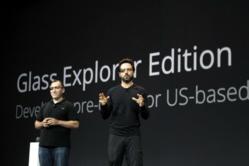
UK – (PRWEB UK) 4 July 2012
London: Sergey Brin, Google co-founder revealed that he hopes consumers will be able to purchase their own pair of Google Glass by 2014. The revolutionary technology, currently still in prototype form are poised for deployment as Explorer Editions to developers early 2013 for a staggering $ 1500.
The question is: is this a product consumers actually want, or another unnecessary gimmick to clutter the homes of millions of people? A recent interview with Google insiders; the original project head, Babak Parviz and product manager Steve Lee reveal why and perhaps more importantly how Google Glass will play a crucial role in consumers lives in the future.
The pair disclosed that the current features of Glass include a large amount of storage, a powerful processor and a camera that takes not only photos but videos too. The device will also come with gyroscope, accelerometers and compasses, in addition to a microphone and the more common Wi-Fi, Bluetooth and GPS.
When asked how people will physically issue a command to the system Parviz replied with, On the side of the device theres a two-dimensional touchpad. We have a button that we typically use for taking pictures. There are microphones in the system, so you could have sound input to the system. Weve experimented with that and weve experimented with gyroscopes and accelerometers and compasses with different types of gesture input. Now, how this is going turn into a consumer product, were still experimenting. Its not entirely finalized yet.
The idea of sharing a first person view of situations is very exciting, not just in extraordinary situations like the parachuting demo but in everyday situations like sharing a shopping experience with a friend to get feedback or advice pre-purchase.
Both Parviz and Lee have been testing the product extensively in their lives, Parviz explains two things he has discovered whilst using Glass. I can communicate with the people I care about through images, so I can capture moments that otherwise I wouldnt capture. I communicate actually a lot more with those people through images and they get the first-person point of view. The other [discovery] involved search. In one of our prototypes I dont know if this will be on the consumer product or not we had search available with an audio input, so you could touch the device and say something, and get the response back. So literally I could touch the device and ask, Whats the capital of China? and the response would just appear in front of my eye. Its a magical moment. You suddenly feel youre a lot more knowledgeable.
Lee commented that as an avid cyclist he was surprised at how unobtrusive and comfortable Google Glass was to wear during a six-hour ride. He noted that he was able to take over 1000 images during the cycle, something that would have been difficult and perhaps un-safe to do so with a hand-held device. Lee then went on to demonstrate a very useful benefit of Glass, I often commute from Google in Mountain View to my home in San Francisco, and I was supposed to meet up with a friend when I arrived. While I was riding, he text-messaged me, and I saw that he was going to be late. I saw that on the display, and that was it. If I didnt have Glass, I wouldve felt the vibration of the phone in my jersey pocket and pulling it out would have been awkward and unsafe. It really made a difference.
It is quite refreshing to know that the average consumer can use this industry-shaking technology in day-to-day activities. There is no need to be a technology specialist or to lead a tech-centred life, Google really are building this into a consumer-friendly device for everyday use. As Lee points out toward the end of the interview, Its my expectation that in three to five years it will actually look unusual and awkward when we view someone holding an object in his or her hand and looking down at it. Wearable computing will become the norm.
With that in mind, will you be purchasing a pair when they launch? Lets just hope Google deliver on their promise to price the device as a consumer affordable, premium product.
AppsCare